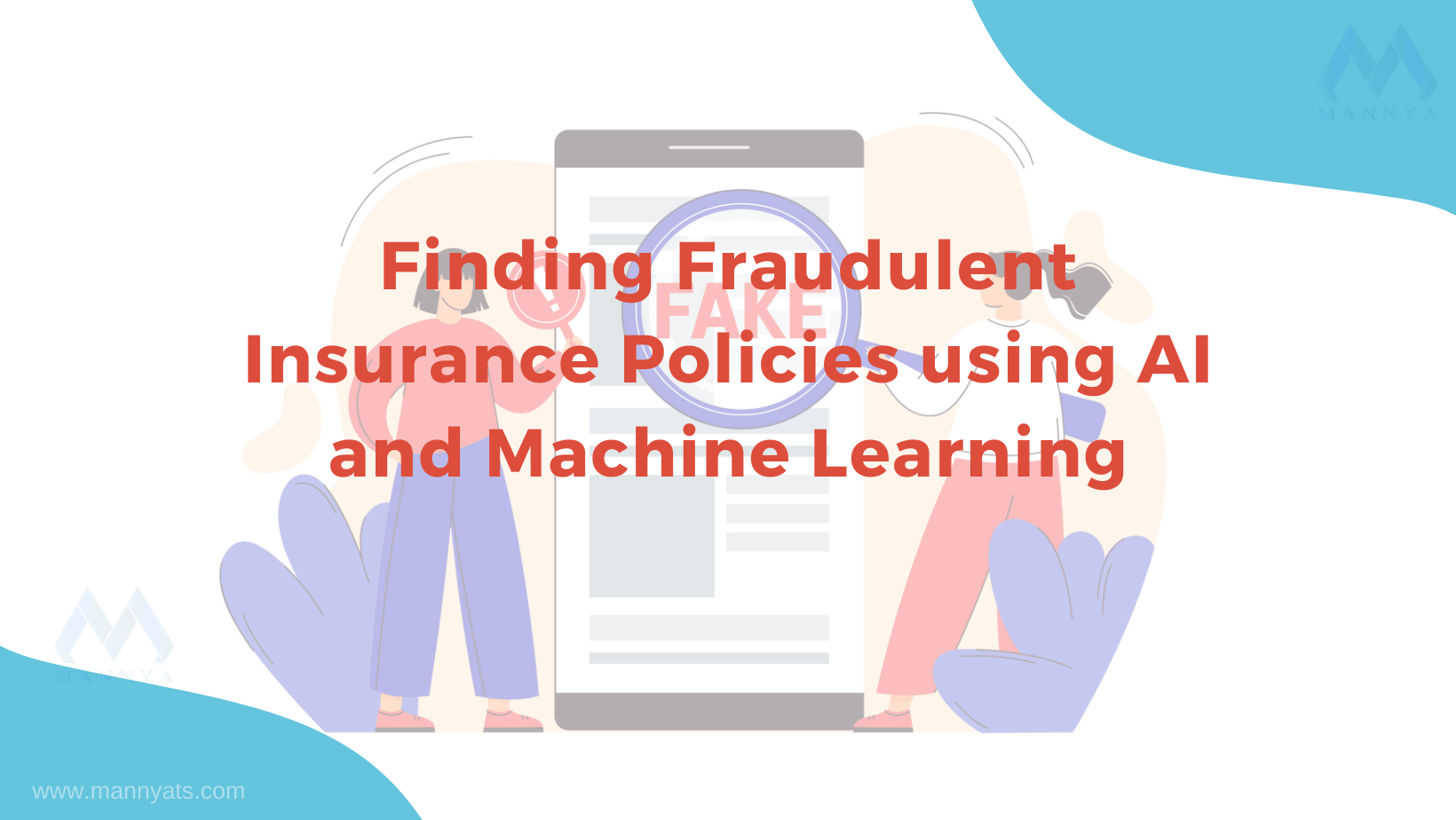Finding Fraudulent Insurance Policies using AI and Machine Learning
Insurance fraud poses a significant challenge for the insurance industry, resulting in substantial financial losses. However, with the advancements in AI and machine learning, it has become possible to detect and prevent fraudulent insurance policies. In this guide, we will delve into the details of various types of fraudulent insurance policies, explore how AI can help identify these fraudulent policies, and discuss the benefits of insurance fraud detection using AI.

Types of Fraudulent Insurance Policies:
- Staged Accidents: Fraudsters deliberately stage accidents or exaggerate injuries to file fraudulent insurance claims, often involving multiple parties colluding to deceive insurers.
- Stolen Identity: Fraudsters may use stolen identities to create fraudulent insurance policies. AI and ML algorithms can detect anomalies by comparing policyholder information with public databases, credit reports, and other data sources.
- Ghost Policies: Ghost policies are non-existent insurance policies created by fraudsters who deceive policyholders into purchasing coverage that does not actually exist.
- Application Fraud: This type of fraud involves policyholders providing false or misleading information on insurance applications, such as omitting pre-existing conditions or misrepresenting their personal details.
- Premium Diversion: Agents or brokers collect premium payments from policy holders but do not remit the funds to the insurance company, resulting in the policy being invalidated without the policyholder’s knowledge.
- Policy Churning: Fraudsters manipulate policy terms, such as cancelling and rewriting policies frequently, to generate additional commission revenue while deceiving the insurance company.
How AI Helps Identify Fraudulent Policies:
- Anomaly Detection: AI algorithms can analyze vast amounts of data to identify patterns and anomalies that indicate potential fraudulent behavior. Deviations from normal patterns, such as unusual claim patterns or inconsistent information, can trigger fraud alerts.
- Data Analysis: AI algorithms can process vast amounts of data quickly and identify patterns and anomalies that humans might miss. By analyzing policy data, financial transactions, and claim records, AI can flag suspicious policies for further investigation.
- Fraud Scoring: AI models can assign fraud scores to policies based on various risk factors and indicators. These scores help prioritize the investigation process, focusing resources on policies with higher fraud likelihood.
- Machine Learning: Machine learning models can learn from historical data to detect fraudulent patterns and continuously improve their accuracy over time. ML algorithms can adapt to new fraud tactics and evolve alongside emerging threats.
- Discovery Analysis: AI systems can perform discovery analysis on unstructured data sources, such as text documents, social media, and online forums, to uncover hidden connections and identify potential fraud networks.
- Predictive Analytics: AI algorithms can analyze historical data to identify patterns and trends associated with fraudulent claims. Predictive analytics helps insurance companies proactively identify potential fraud risks.
- Natural Language Processing (NLP): NLP techniques can be applied to policy documents, claims forms, and other textual data to extract relevant information and identify discrepancies, inaccuracies, or red flags that indicate potential fraud.
- Network Analysis: AI can analyze complex networks of relationships among policyholders, agents, and service providers to uncover connections that may indicate fraud rings or collusion.
Benefits of Insurance Fraud Detection using AI:
- Increased Accuracy: AI algorithms can analyze large volumes of data quickly and accurately, identifying fraudulent patterns that may go unnoticed by manual review processes.
- Real-time Detection: AI-based systems can provide real-time fraud alerts, enabling insurers to take immediate action to mitigate potential losses and prevent payouts on fraudulent claims.
- Cost Savings: By identifying and preventing fraudulent policies, insurers can reduce financial losses, lower claim costs, and optimize resource allocation.
- Enhanced Efficiency: AI can automate fraud detection processes, freeing up human resources to focus on more complex fraud investigations and improving overall operational efficiency.
- Continuous Learning: AI models can continuously learn and adapt based on new fraud patterns and emerging trends, improving fraud detection capabilities over time.
In conclusion
Insurance fraud is a persistent challenge for the industry, but AI and machine learning offer powerful tools to combat it effectively. By leveraging AI algorithms for anomaly detection, predictive modeling, NLP, and network analysis, insurers can identify and prevent various types of fraudulent insurance policies. The benefits of insurance fraud detection using AI include increased accuracy, real-time detection, cost savings, enhanced efficiency, and continuous learning. Embracing AI-driven fraud detection enables insurers to protect their business, policyholders, and the overall integrity of the insurance industry in the face of evolving fraud schemes.
Why Mannya Techno Solutions?
Mannya Techno Solutions is a global IT services firm headquartered in Pleasanton, California and having offshore delivery center in India. Mannya has extensive experience and expertise in CRM, Cloud & Digital Solutions, Oracle and Mobility. We are an associated partner company with Salesforce, AWS, Oracle, and Google and have worked with many leading players in the Manufacturing, E-commerce, Digital, Healthcare, Education, Entertainment/OTT, Hi-Tech and Telecom domains. Mannya provides a portfolio of business and technology consulting services to fully unleash the cloud’s potential. Our competent and talented pool is extensively experienced in delivering vertical-specific solutions.
Share:
Recent Posts
- Optimize Your Salesforce Org With These 7 Critical Insights
- The Martech Revolution A Comprehensive Guide to Unleashing Marketing Technology’s Power
- Unlocking Integration Excellence: The Ultimate MuleSoft Guide for Seamlessly Transforming Middleware
- Salesforce Lightning Web Components (LWC) and Lightning (Aura) Components: A Lightning Transformation
- The Power of Chat GPT and Salesforce Integration A Comprehensive Technical Guide
